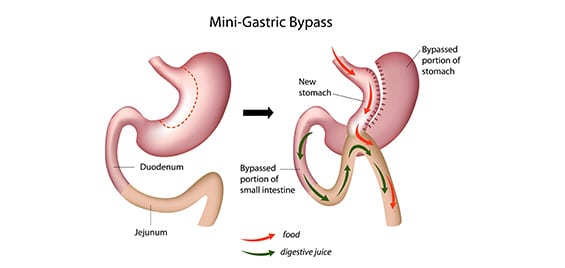Gastric Bypass

Enjoy a healthier lifestyle with Gastric Bypass surgery.
The purpose of gastric bypass surgery is to physically shrink the size of the stomach to reduce the amount of food that can be comfortably processed at any given time. As a result of a reduced food intake, people who have the procedure will lose weight.
- This type of surgery is only for individuals who have not had success with other attempts at weight loss.
- It’s also a procedure that requires a commitment to healthy lifestyle adjustments.
How It’s Done
The most common type of gastric bypass surgery performed in the United States (Roux-en-Y gastric bypass) involves smaller cuts, which often means fewer risks and a faster recovery time for patients. During the procedure, a small stomach pouch is created. Part of the small intestine is then attached to the newly created pouch. Doing so will reduce calorie intake from food that’s consumed. Since the newly created pouch is smaller than a normal stomach, less food will be eaten at any given time.
After Bypass Surgery
Following the procedure, a liquid diet is often recommended during the initial healing period. This will be followed by a transition to soft foods. Patients are sometimes asked to start making dietary adjustments prior to surgery to get used to new eating habits. A referral may be made to a dietician for additional guidance with dietary adjustments.
Continued Weight Loss Success
The odds of enjoying successful results from bypass surgery greatly increase when patients commit to making healthy eating choices. Since there is less absorption of nutrients due to the way the stomach is set up after bypass surgery, it’s important to eat foods rich in vitamins and other necessary nutrients. Vitamin supplements may be needed to avoid B-12 and iron deficiencies.
Long-Term Results
Patients who experience the most success with this type of weight loss surgery are those who have realistic expectations. It’s common for people who have this procedure to lose about half their excess weight within a year. Results will vary based on several factors, including metabolism and adherence to post-surgery guidelines and instructions.
Boosting Odds of Success
Gastric bypass itself is meant to provide a starting point for meaningful lifestyle changes. In addition to diet, this means getting regular exercise and staying physically active. Some people who have had bypass surgery report improved overall health due to better management of underlying health issues as weight is lost. Patients will be evaluated during follow-up visits to ensure that healing is progressing as expected.
Being Prepared
Patients are encouraged to ask questions and become as informed as possible about the procedure to ensure it’s an appropriate option. Gastric bypass is a permanent approach to weight loss that will require a commitment to changing eating habits.
Ideal candidates for gastric bypass surgery must have a body mass index (BMI) of 40 or more or be over their ideal weight by at least 100 pounds. Some exceptions may be made if weight loss is necessary to bring obesity-related health conditions such as sleep apnea, high blood pressure, or diabetes under control. These determinations will be made on an individual basis.

